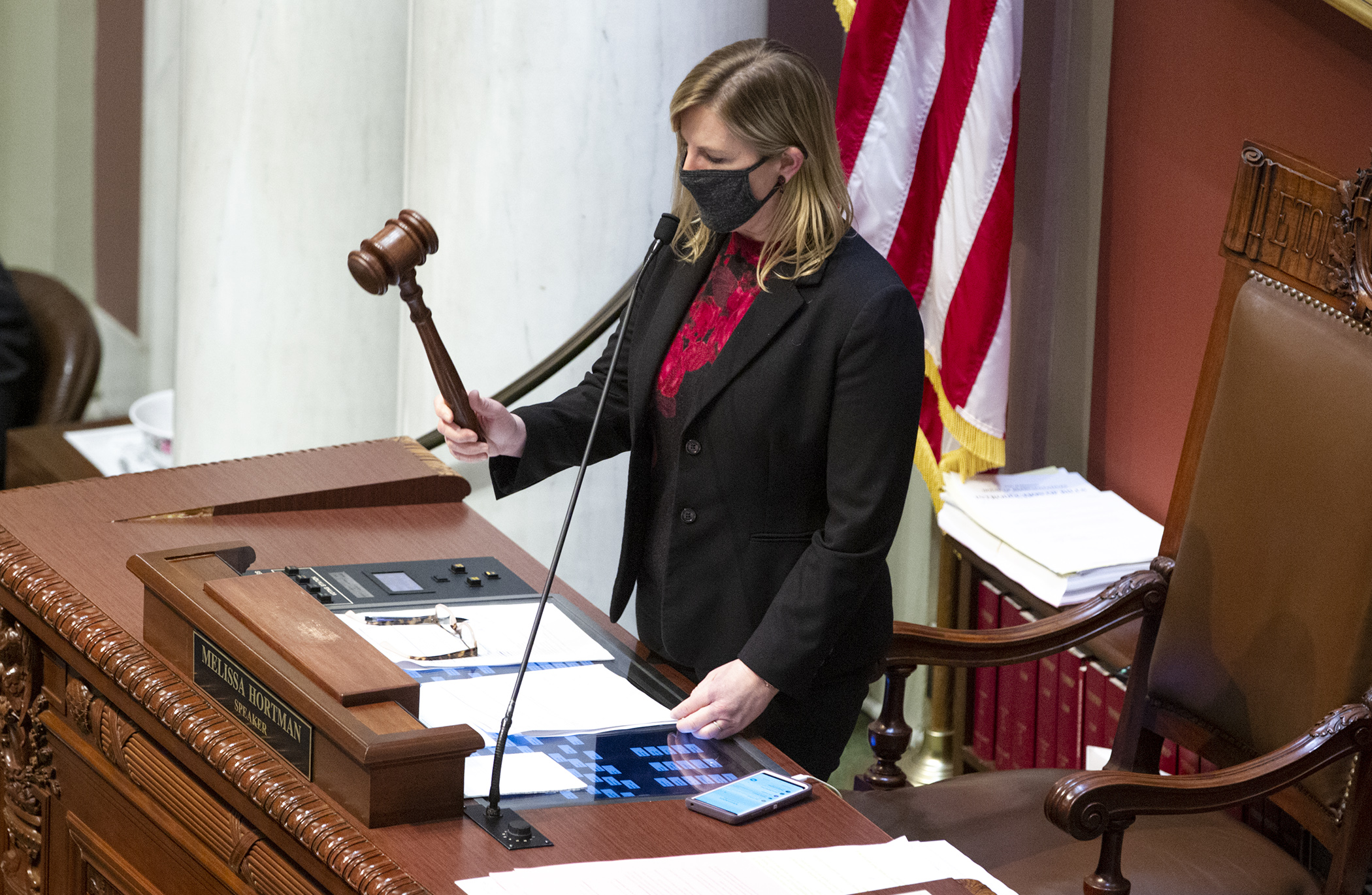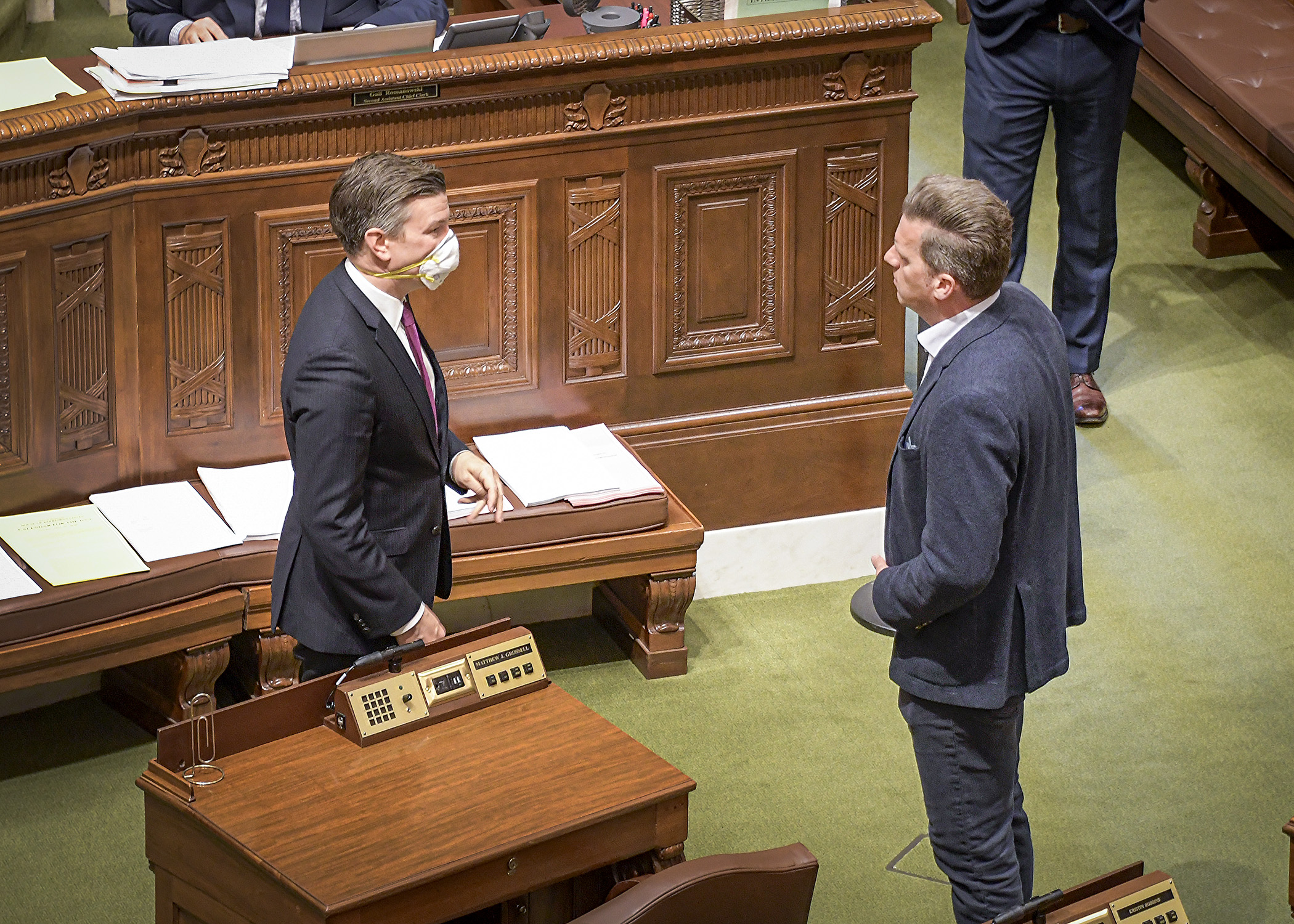As session ends, Legislature leaves much unresolved — but leaders say that could yet change

A politically neutral pandemic played a big part in plenty being left unfinished when the 2020 legislative session concluded early Monday morning.
Yet, hope remains things can still get done.
As the clock counted down to the midnight deadline to pass legislation, it became more apparent with each tick that partisan politics would again prove too much to overcome for many issues, meaning legislators left the State Capitol with lots still on the plate, including bonding, oversight of federal coronavirus relief funds, housing assistance and tax changes.
“I’m hopeful for the future. If we hadn’t had COVID-19, I think all of those things would have happened at the end,” Senate Majority Leader Paul Gazelka (R-East Gull Lake) said at a Monday media availability.
The coronavirus changed things in a way nobody had experienced.
“The pandemic kind of reached in and grabbed the heart of the legislative session out,” House Speaker Melissa Hortman (DFL-Brooklyn Park) said at a media availability. “While we did some really good work to address COVID-19, the regular work of this session, a bonding bill, didn’t get done in time.”
Now what?
 House Majority Leader Ryan Winkler, left, and House Minority Leader Kurt Daudt confer — at a distance — on the House floor during a May 17 recess. Photo by Andrew VonBank
House Majority Leader Ryan Winkler, left, and House Minority Leader Kurt Daudt confer — at a distance — on the House floor during a May 17 recess. Photo by Andrew VonBank"The question before us is whether our political system in Minnesota can rally, come together again as it did for a few weeks this session, and begin to address the long-term economic consequences and health consequences of COVID-19,” said House Majority Leader Ryan Winkler (DFL-Golden Valley). “What we’ve seen in the waning days of the legislative session can’t continue.”
Everything seemed normal early in a session in which little had to get done. Committees and divisions met in person to discuss and create proposals members hoped could eventually reach the desk of Gov. Tim Walz.
Little did anyone know that would soon turn, forcing the House to dramatically change how it operates. The State Office Building and State Capitol became eerily silent. Remote hearings via Zoom replaced face-to-face interaction, social distancing become a mandate and members in the House Chamber often wore masks while others fulfilled their role from locations all around the state.
In less than 10 weeks, the state budget experienced a nearly $4 billion swing from a projected $1.5 billion surplus in late February to a projected $2.4 billion shortfall by early May.
A nearly $50 billion biennial state budget was put together last year, so members could — and, with so many unknowns, largely did — put off any action on that issue. That left a bonding bill as the golden item sought in 2020, as is tradition in the second year of a biennium.
The House unveiled a $2.5 billion capital investment package — $2.03 billion in general obligation bonds — with about a week to go in the session; the Senate put forth a package that included $998 million package Saturday. Both failed to reach the three-fifths threshold for passage in each body. Three Senate DFLers were the only people in either body to cross party lines.
House Republicans said HF2529 was too big in today’s economic climate; many Senate DFLers said SF3463 bill was too small and too partisan. House DFLers noted the state’s growing list of needs — more than $5 billion was requested — lower interest rates and a chance to put people back to work among reasons for support.
Everyone ended up with zero. So far.
Gazelka said agreement was reached on a final number. He would not divulge the sum, but hinted it’s in the $1.1 billion to $1.3 billion range.
A deal could be acted upon next month.
If Walz opts to extend his emergency powers next month, it would trigger a special session, which many members anticipate would be June 12. In a post-session statement, House Minority Leader Kurt Daudt (R-Crown) urged unity.
“The coming weeks will give us further clarity on our state's financial situation, time to evaluate our response to the pandemic, and time to make better decisions. We did our best work this session when all four caucuses worked together closely with the governor, and I look forward to doing exactly that between now and June 12."
“We’re already close on many things,” Gazelka said.
“Minnesotans want us to work together,” Walz said. “… These issues that keep coming up will demand that we work together.”
It’s not as though nothing got accomplished in 2020. A few new laws include:
- more than $550 million allocated to address the impact of the COVID-19 pandemic in Minnesota;
- diabetics will be able to get affordable insulin on both an emergency and long-term basis;
- raising to 21 the age to buy tobacco;
- becoming the first state to ban the use of the industrial solvent TCE for permitted facilities, with narrow exemptions, by June 1, 2022;
- acceptance of $17 million in federal funds to help with election security and administration;
- establishment of new financial exploitation protections for older adults and vulnerable adults;
- $30 million to replenish the state’s Disaster Assistance Contingency Account; and
- a loan agreement with the federal government was passed to end a years-long effort to expand a stretch of U.S. Highway 14 between Nicollet and New Ulm.
A handful of other bills have been sent to Walz for action. Among those are omnibus higher education and public safety bills and a bill to addresses school finance formula glitches resulting from the conversion to the distance learning model.
By the way, the Nov. 3 election is 24 weeks from Tuesday.
Related Articles
Search Session Daily
Advanced Search OptionsPriority Dailies
Ways and Means Committee OKs proposed $512 million supplemental budget on party-line vote
By Mike Cook Meeting more needs or fiscal irresponsibility is one way to sum up the differences among the two parties on a supplemental spending package a year after a $72 billion state budg...
Meeting more needs or fiscal irresponsibility is one way to sum up the differences among the two parties on a supplemental spending package a year after a $72 billion state budg...
Minnesota’s projected budget surplus balloons to $3.7 billion, but fiscal pressure still looms
By Rob Hubbard Just as Minnesota has experienced a warmer winter than usual, so has the state’s budget outlook warmed over the past few months.
On Thursday, Minnesota Management and Budget...
Just as Minnesota has experienced a warmer winter than usual, so has the state’s budget outlook warmed over the past few months.
On Thursday, Minnesota Management and Budget...